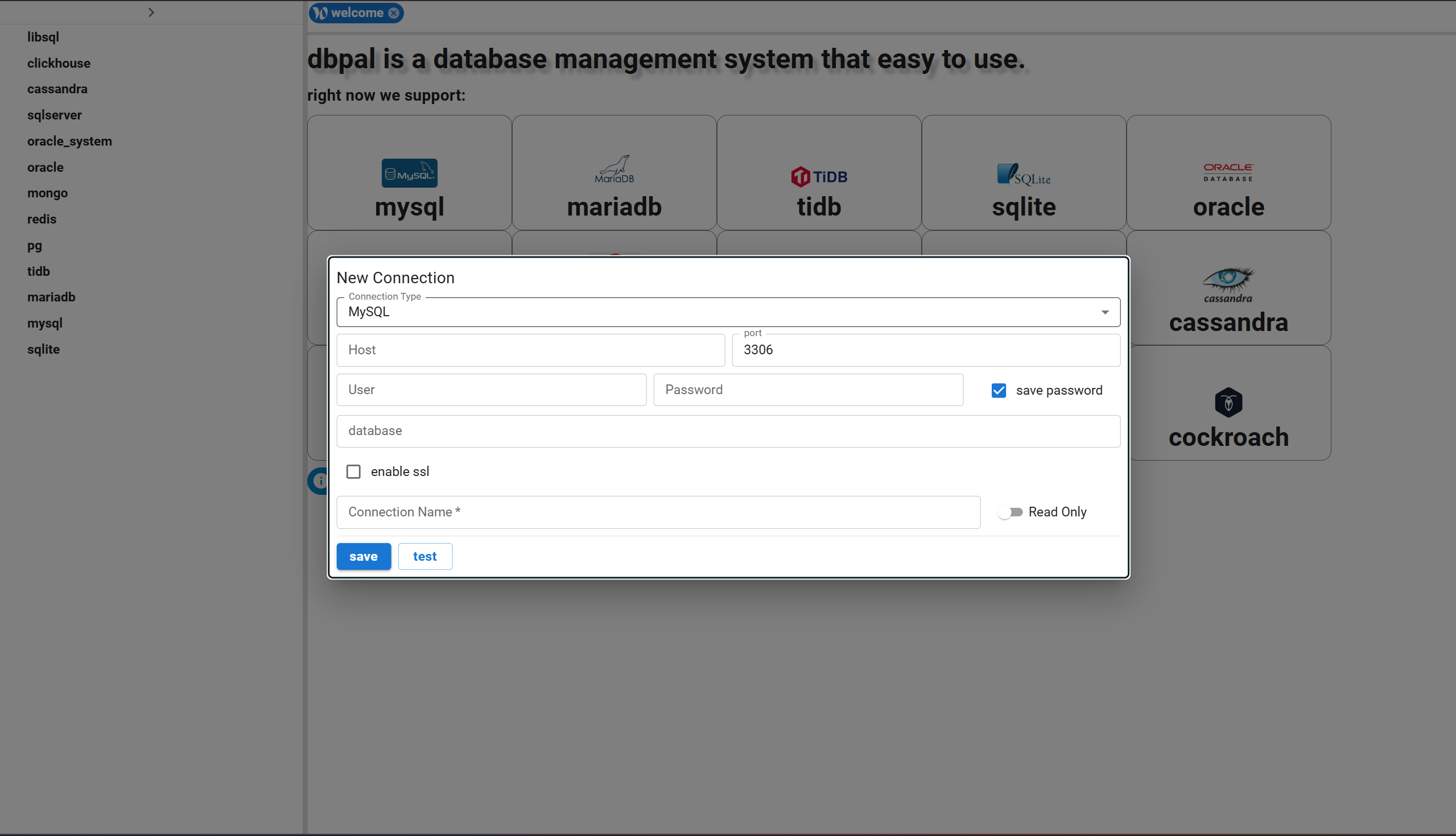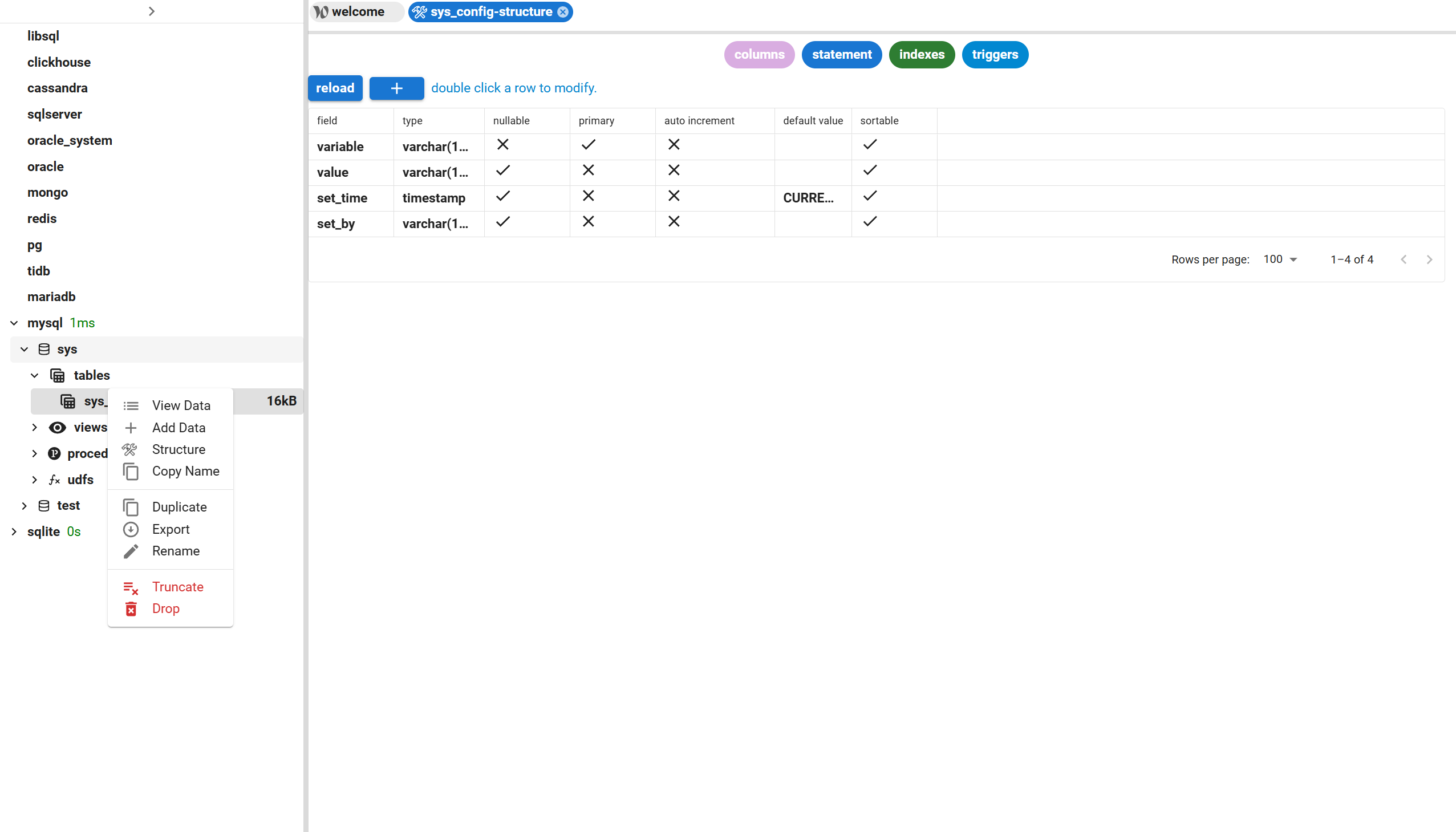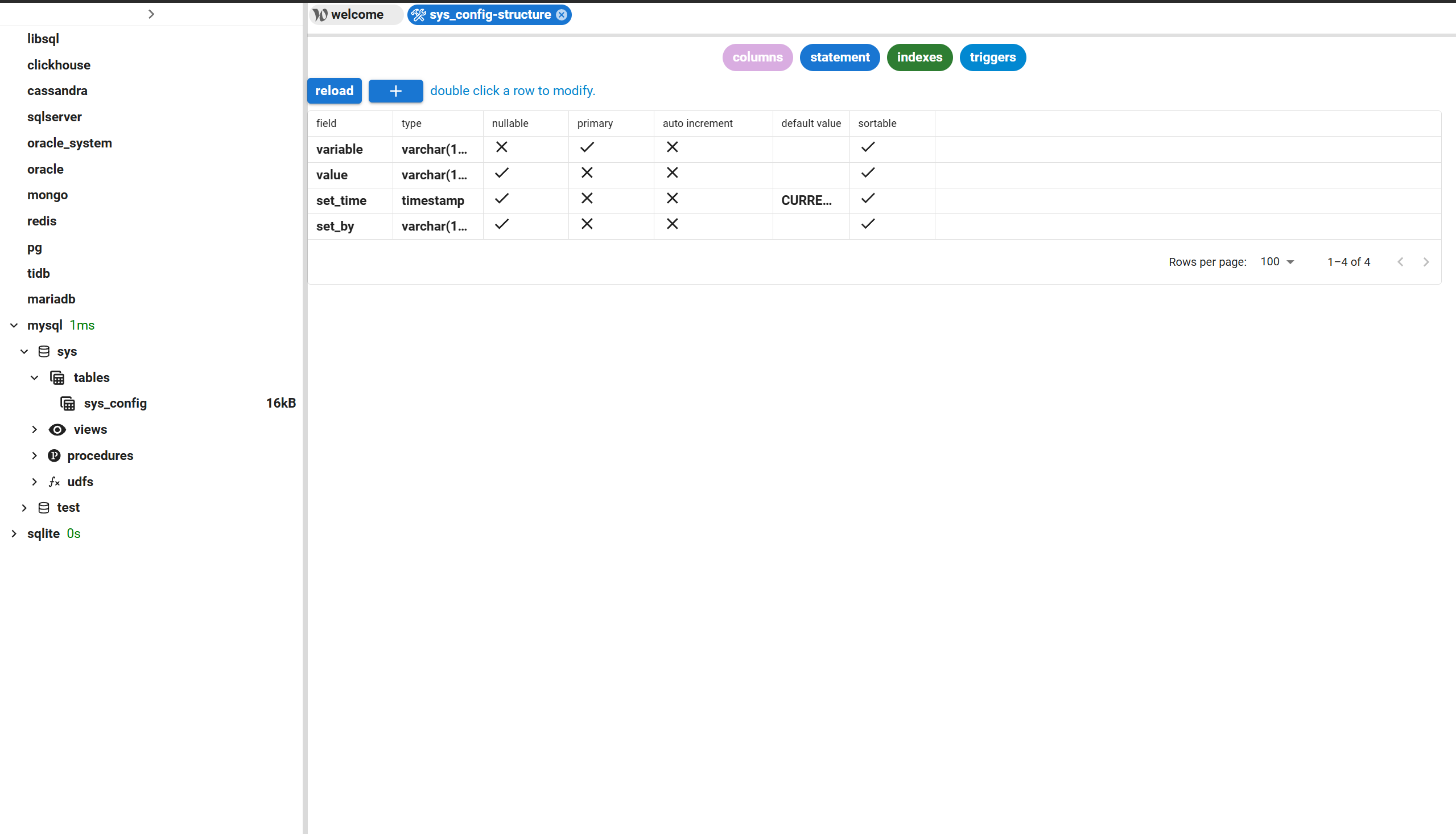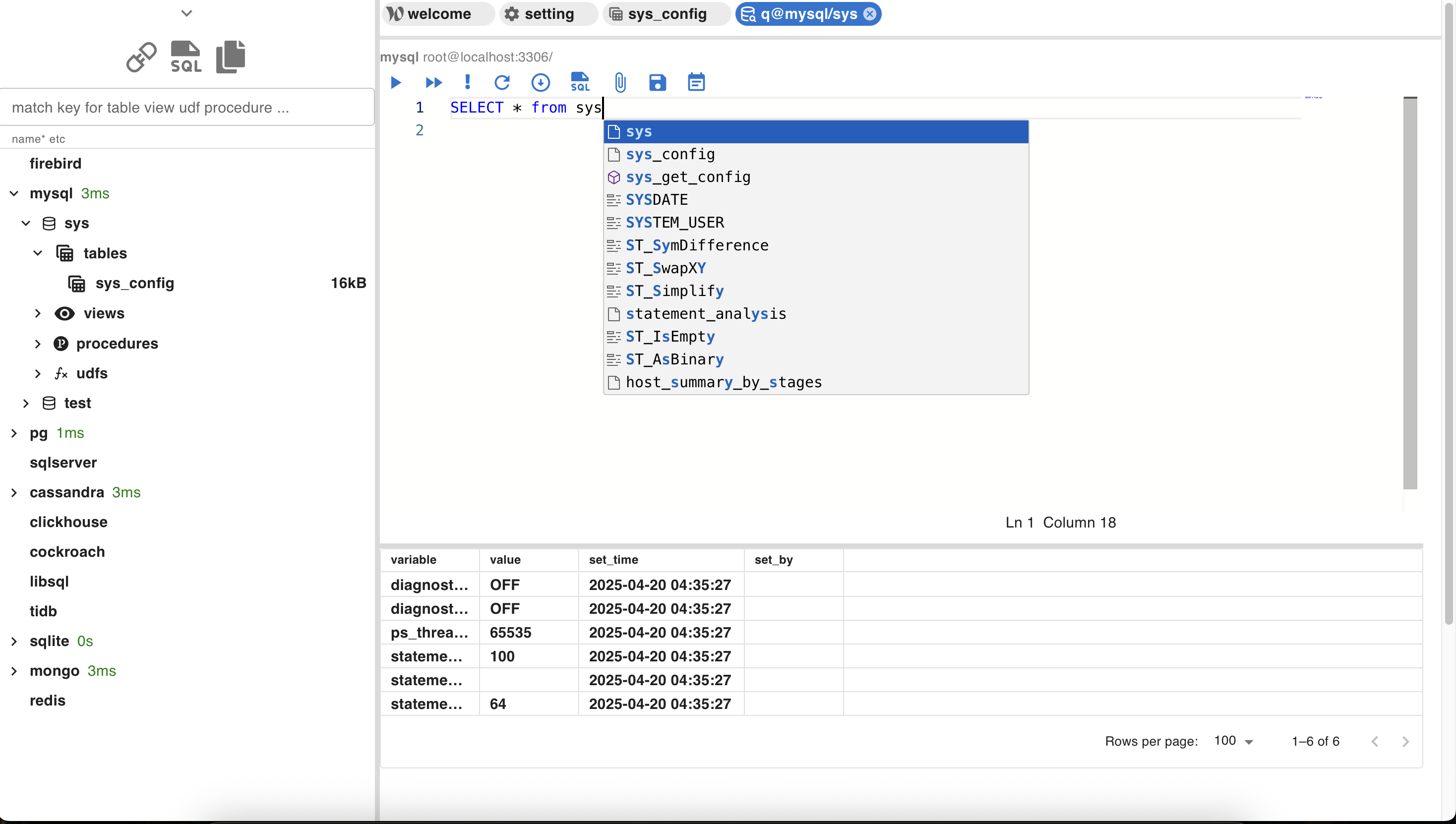docs
dbpal
![]() dbpal is a very simple database management system with good
functionality, ease of use and low resource usage. It supports postgres,
mysql, sqlite, etc…
dbpal is a very simple database management system with good
functionality, ease of use and low resource usage. It supports postgres,
mysql, sqlite, etc…

video demo
install
support those database system
- mysql
- tidb
- mariadb
- sqlite
- redis
- mongo
- oracle
- sql server(microsoft)
- postgres
- clickhouse
- libsql
- firebird
- cockroach
- cassandra
report issue
features
- easy to use
- fast
- low memory consumption
- low cpu usage
- sql editor(auto completion ,high light)
- open a lot of tabs
- security (power by rust)
- small binary size
- export query to file
- export table or view to file
mongo query editor
mongo use webkit build in js interpreter via eval, dbpal predefine
some variable for interact with database such as db etc …
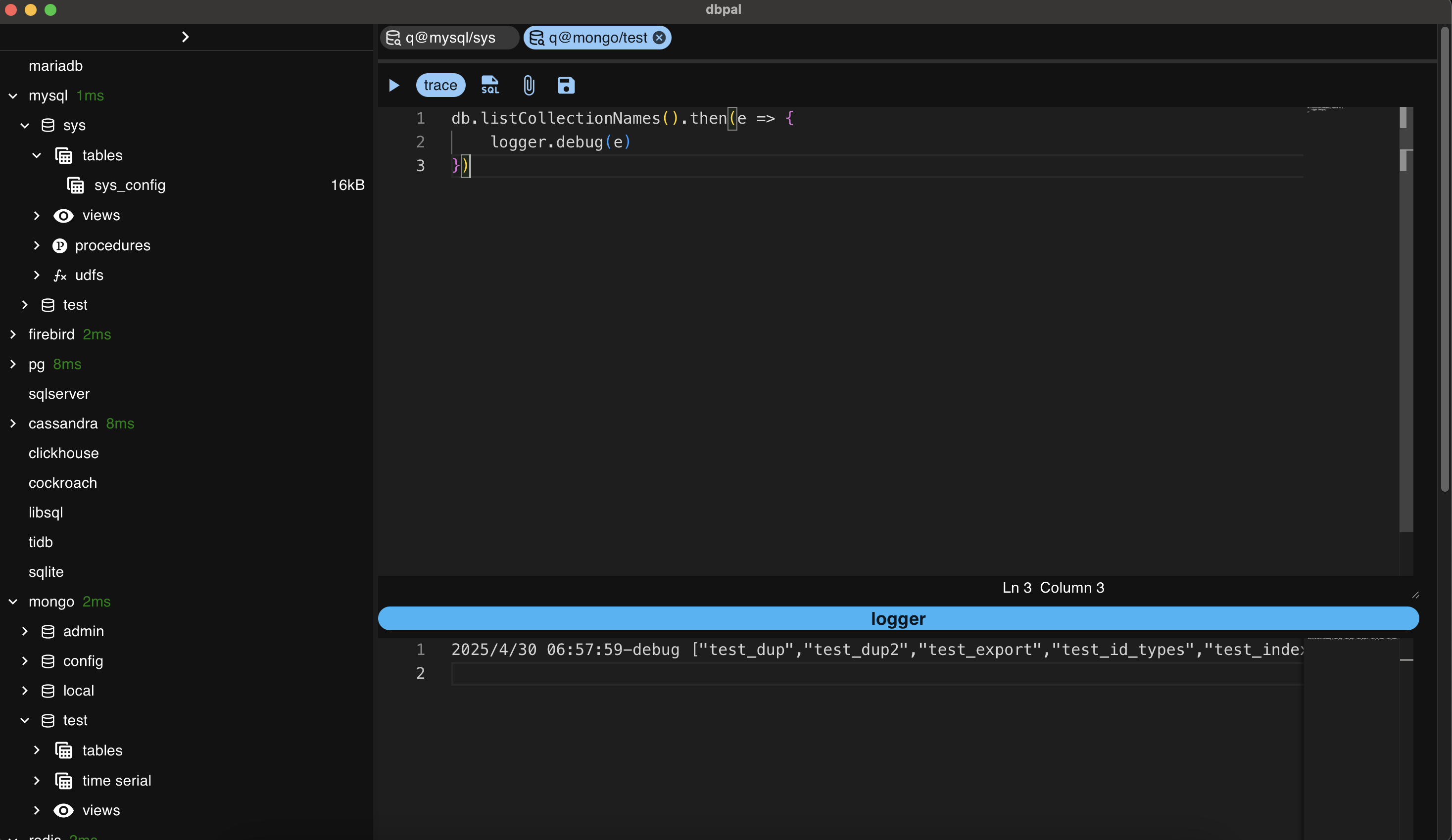
full predefined variable and types see the code blow.
interface ILogger {
trace: (...msg: any[]) => void;
debug: (...msg: any[]) => void;
log: (...msg: any[]) => void;
info: (...msg: any[]) => void;
warn: (...msg: any[]) => void;
error: (...msg: any[]) => void;
}
interface IMongoDB {
collection: (name: string) => IMongoCollection;
createcollection: (name: string) => IMongoCollection;
drop: () => Promise<void>;
listCollectionNames: () => Promise<string[]>;
runCommand: (doc: BSON.Document) => Promise<BSON.Document>;
}
interface IMongoCollection {
cuntDocuments: () => Promise<number>;
createIndex: (index: BSON.Document) => Promise<string>;
createSerachIndex: (
index: BSON.Document,
name: string | null
) => Promise<string>;
deleteMany: (filter: BSON.Document) => Promise<BSON.Document>;
deleteOne: (filter: BSON.Document) => Promise<BSON.Document>;
distinct: (field: string, filter: BSON.Document) => Promise<any[]>;
drop: () => Promise<void>;
dropIndex: (name: string) => Promise<void>;
dropIndexes: () => Promise<void>;
dropSearchIndex: (name: string) => Promise<void>;
find: (filter: BSON.Document) => IFind;
findOne: (filter: BSON.Document) => IFindOne;
findOneAndDelete: (filter: BSON.Document) => Promise<BSON.Document | null>;
findAndReplace: (
filter: BSON.Document,
replacement: BSON.Document
) => Promise<BSON.Document | null>;
insertMany: (docs: BSON.Document[] | BSON.Document) => Promise<any>;
insertOne: (doc: BSON.Document) => Promise<any>;
listIndexNames: () => Promise<string[]>;
listIndexes: () => Promise<any[]>;
listSearchIndexes: () => Promise<BSON.Document[]>;
// collection name;
name(): string;
replaceOne: (
query: BSON.Document,
replacement: BSON.Document
) => Promise<any>;
updateMany: (
query: BSON.Document,
doc: BSON.Document
) => Promise<any>;
updateOne: (
query: BSON.Document,
docs: BSON.Document
) => Promise<any>;
}
interface IFindCommon {
max: (doc: BSON.Document) => IFind;
min: (doc: BSON.Document) => IFind;
projection: (doc: BSON.Document) => IFind;
sort: (doc: BSON.Document) => IFind;
skip: (x: number) => IFind;
}
interface IFindOne extends IFindCommon {
find: () => Promise<BSON.Document>;
}
interface IFind extends IFindCommon {
limit: (x: number) => IFind;
find: () => Promise<BSON.Document[]>;
}
class BsonExtraDataType {
newLong(...args): BSON.Long {
//@ts-ignore
return new BSON.Long(...args)
}
newObjectID(inputId?: string | number | BSON.ObjectId | BSON.ObjectIdLike | Uint8Array): BSON.ObjectId {
return new BSON.ObjectId(inputId);
}
newInt32(...args): BSON.Int32 {
//@ts-ignore
return new BSON.Int32(...args);
}
newTimeStamp(...args): BSON.Timestamp {
//@ts-ignore
return new BSON.Timestamp(...args)
}
newDecimal128(bytes: Uint8Array | string): BSON.Decimal128 {
return new BSON.Decimal128(bytes);
}
newJavaScriptCode(code: string | Function, scope?: Document | null): BSON.Code {
return new BSON.Code(code, scope);
}
newBinary(...args): BSON.Binary {
//@ts-ignore
return new BSON.Binary(...args);
}
binaryCreateFromHexString(hex: string, subType?: number): BSON.Binary {
return BSON.Binary.createFromHexString(hex, subType);
}
binaryCreateFromBase64(base64: string, subType?: number): BSON.Binary {
return BSON.Binary.createFromBase64(base64, subType);
}
binaryFromInt8Array(array: Int8Array): BSON.Binary {
return BSON.Binary.fromInt8Array(array)
}
binaryFromFloat32Array(array: Float32Array): BSON.Binary {
return BSON.Binary.fromFloat32Array(array)
}
}
let db : IMongoDB;
let logger : ILogger;
let bsonExtraDataType : BsonExtraDataType
mongo dsl
a small dsl to support all bson data types. mongo has more type than
json so we decide to develop a small dsl to support those data types.
It is very simple that no need to learn.
It used in a lot of places like edit , view data.
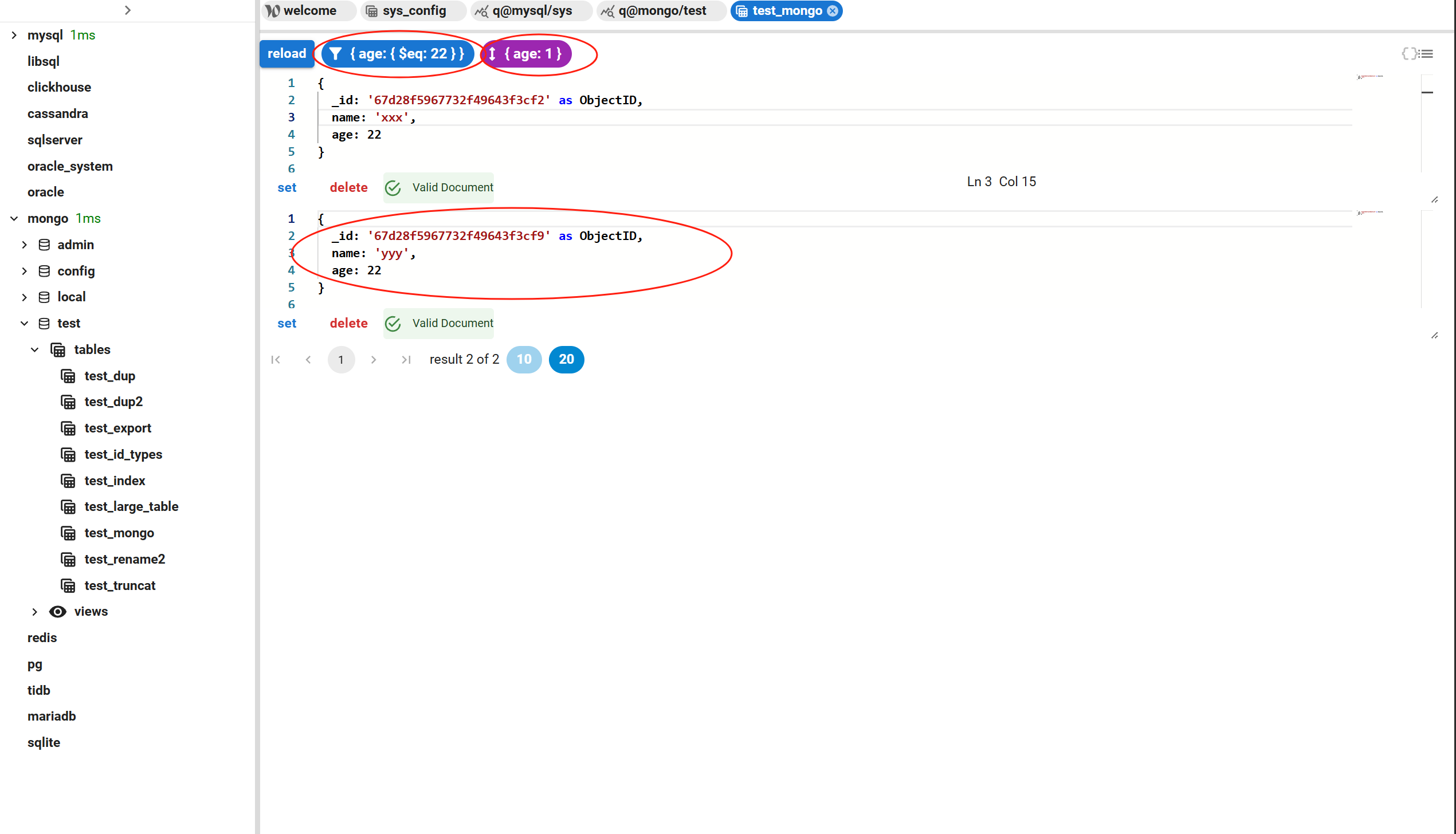
here is a demo
{
_id: '67ff4141df774f7cb32f77d3' as ObjectID, // convert a to ObjectID
string_field: 'Hello, world!',
int_field: 123,
float_field: 123.45,
bool_field: true,
date_field: '2025-04-16T05:33:53.000Z' as date,
null_field: null,
regex_field: /haha/i, // regexp
// binary
binary_field: [ 1, 2 ] as binary vector int8,
binary_field2: [ 1, 2 ] as binary vector float32,
binary_field3: [ 104, 101, 108, 108, 111 ] as binary generic,
binary_field4: [ 104, 101, 108, 108, 111 ] as binary encrypted,
binary_field5: [ 104, 101, 108, 108, 111 ] as binary user_define 10,
uuid_field: [ 123, 199, 23, 38, 202, 184, 67, 6, 151, 11, 43, 111, 236, 163, 109, 7 ] as binary uuid,
array_field: [ 1, 2, 3 ],
object_field: { nested_key: 'nested_value' },
decimal_field: '1' as decimal,
timestamp_field: 1744781633 as timestamp 1 // 1 as increment
}
mongo query error line number
dbpal wants to provide the line number of the error information when using mongo query, but it is a bit difficult.
The eval function does not provide the error line information when an error occurs.
Therefore, dbpal uses esprima to parse your source code before executing mongo query. Therefore, the source code of the syntax error can provide the line number.
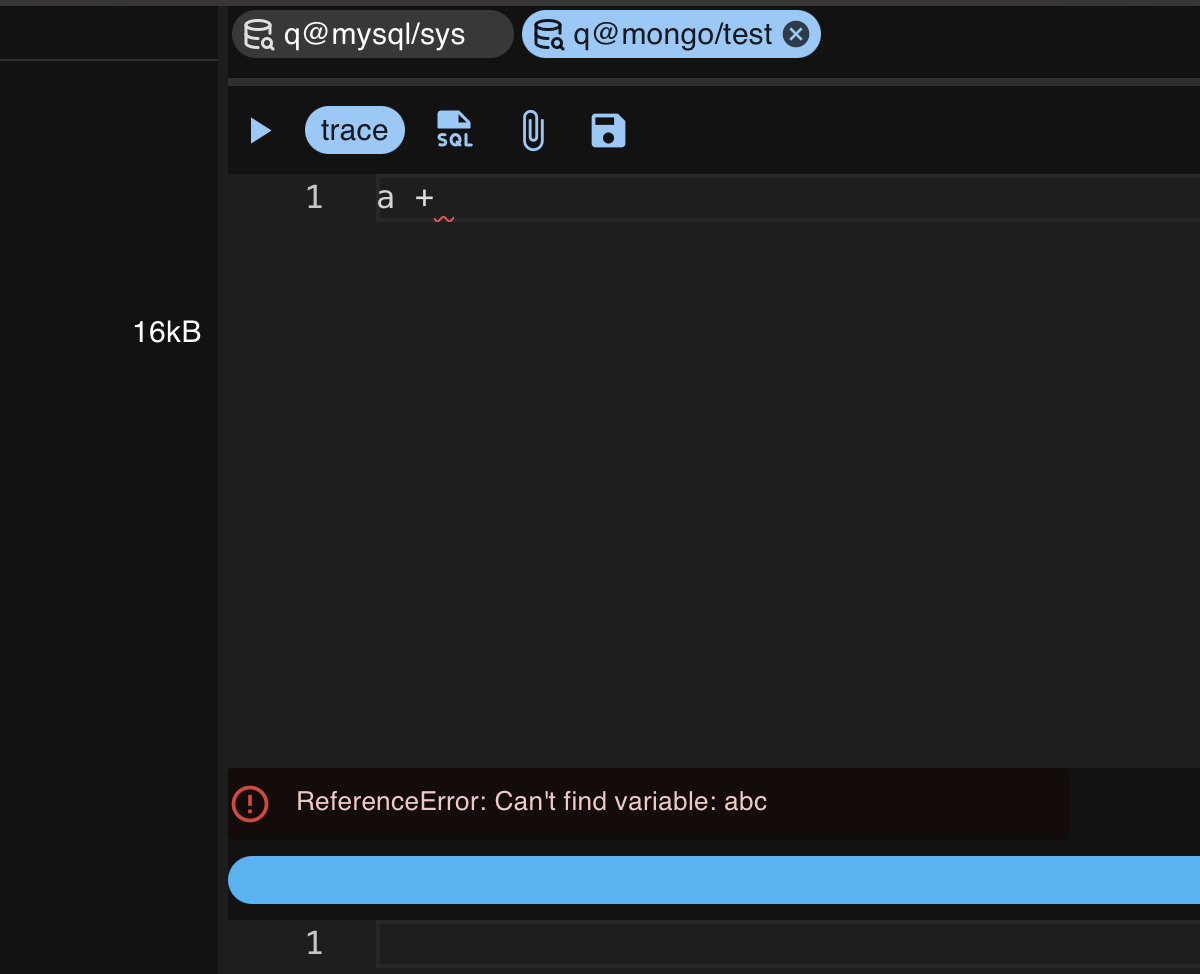
If the source code can be parsed correctly, there will be no line number information later.
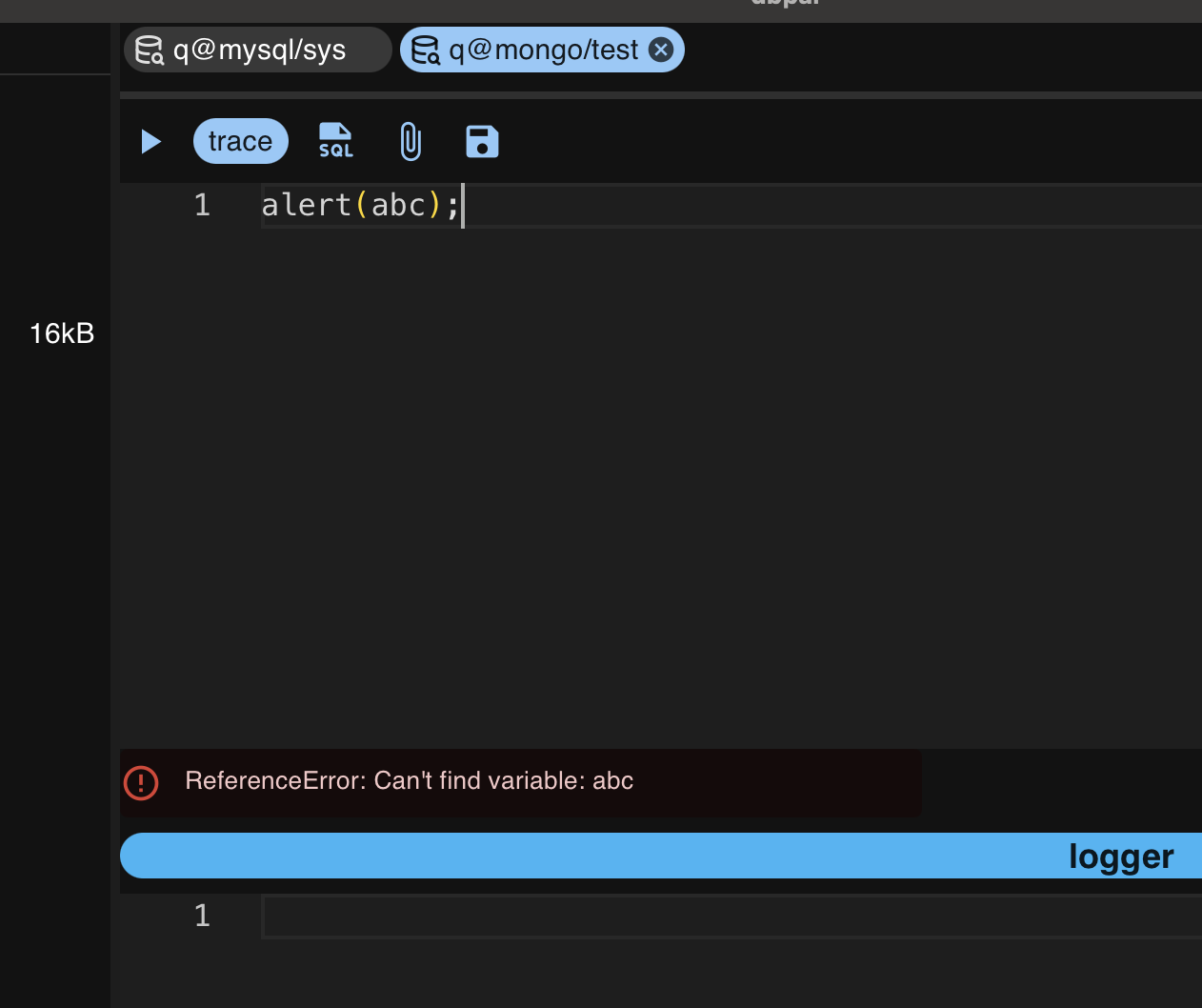
Privacy Policy
Effective Date: April 28, 2025
At dbpal, we are committed to protecting your privacy. This Privacy Policy outlines our practices regarding the collection, use, and protection of your information.
- Information We Do Not Collect
We do not collect any personal information from our users. This includes, but is not limited to:- Names
- Email addresses
- Phone numbers
- Payment information
- Location data
-
Use of Information
Since we do not collect any personal information, we do not use, share, or sell any user information to third parties. -
Changes to This Privacy Policy
We may update this Privacy Policy from time to time. We will notify you of any changes by posting the new policy on our website. Your continued use of our services after any changes indicates your acceptance of the new policy. - Contact Us
If you have any questions about this Privacy Policy, please contact us at: 756445638@qq.com
screen shots
